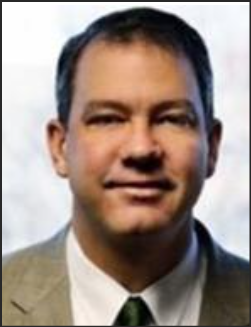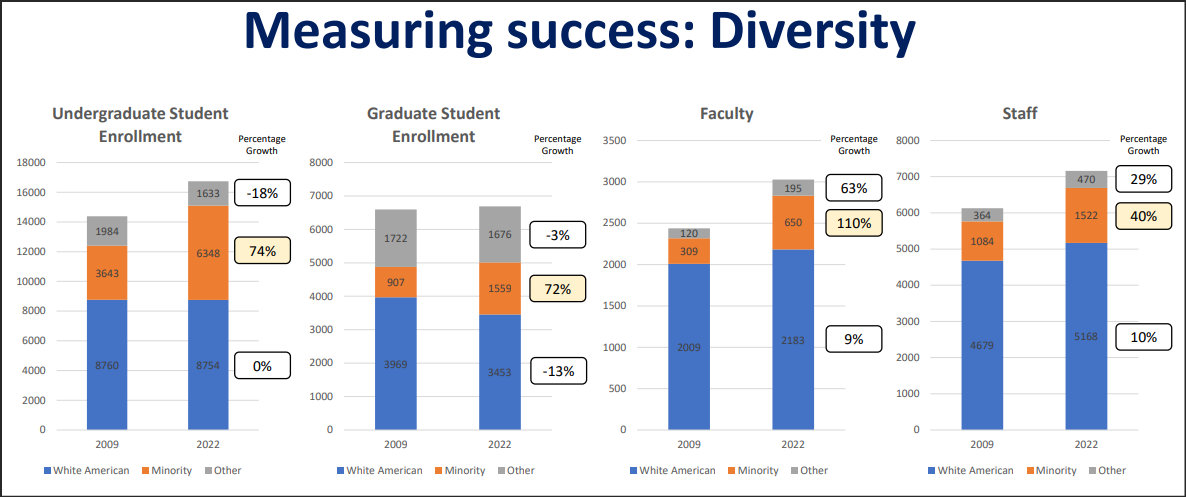
by James A. Bacon
The University of Virginia leadership normally keeps its Board of Visitors meetings running on such a tightly scripted schedule that board members rarely get an opportunity to engage in free-wheeling discussion. But Rector Whitt Clement and President Jim Ryan made an exception Friday during the board’s June meeting: they set aside nearly an hour to talk about Diversity, Equity & Inclusion.
Board member Douglas Wetmore, a Richmond businessman appointed by Governor Glenn Youngkin, set the tone as soon as the discussion began. On paper the administration values “viewpoint diversity” along with demographic and other forms of diversity, he noted. But unlike the meticulous statistics it compiles on the racial and gender breakdown of students, faculty, and staff, he said, the university does not track viewpoint diversity at all.
“We want a wide range of competing ideas,” Wetmore said. “One hundred percent of statistics are related to race and gender. I haven’t seen one reflecting viewpoint diversity,” he said.
While a few board members suggested that viewpoint diversity was not a serious issue at UVa, the ensuing discussion revolved mainly around how to define viewpoint diversity, how much of such diversity was desirable, and how to measure it while respecting individuals’ right to privacy.
The Board conversation was unprecedented at UVa, where the DEI bureaucracy dedicated to advancing the interests of “marginalized” minorities has grown to 55 employees by the university’s own count.
DEI is reigning dogma at UVa, and it suffuses almost everything the university does. DEI officials play a hand in crafting innumerable policies, initiatives and guidelines. Faculty and staff undergo DEI training. Students are steeped in DEI-driven instruction at orientation. The values and priorities arising from diversity, equity, and inclusion largely define the culture of UVa today.
Nationally, DEI has been questioned on many grounds, but the foremost is the threat it represents to free speech, free expression, and intellectual diversity. College administrators, conservatives allege, enforce intellectual conformity on cultural and social-justice issues by policing microaggressions, requiring applicants and employees to fill out diversity statements, tolerating social ostracism of speech code offenders, and, at many other campuses, disrupting speakers who express unpopular views.
Against this backdrop, UVA officials have taken steps to affirm their commitment to free speech. Last year the UVa Board of Visitors endorsed a statement speech written by a Ryan-appointed Committee on Free Expression and Free Inquiry. In March, the Board endorsed a statement by the Council of Presidents, comprised of Virginia university presidents, that proclaimed support not only for free speech but viewpoint diversity. Then, with DEI exploding as a leading national issue, Ryan argued in a higher-ed trade publication last month that DEI was misunderstood. The “e” in DEI, equity, does not call for equal outcomes but equal opportunity, he contended. On the other hand, he did acknowledge that some DEI policies, such as diversity statements, could be viewed as coercive.
Just as the intellectual and political environment has begun shifting nationally, conservative members appointed by Governor Glenn Youngkin are poised to become a majority on the UVa Board of Visitors. A reappraisal of DEI under Virginia’s Republican administration, and Ryan got out front of the change in power while Democratic appointees still dominated the Board.
In a presentation to the Board (see the slide deck), Ryan said, “We will live by and promote the values at the heart of the University, including service, excellence, honor, diversity and inclusion, free speech and academic freedom. Also, we will both study and be accountable as an institution to address pressing societal challenges, including environmental sustainability, social mobility, educational inequities, and health disparities.”
Ryan defined “diversity” as “the full spectrum of human attributes, perspectives, identities, backgrounds, and disciplines,” encompassing:
- gender, race, ethnicity
- religion
- professional experience, and
- political ideology and point of view.
He then presented a slide entitled, “Measuring Success: Diversity.”
The chart shows significant growth in “minority” students (defined as Asian-American, Hispanic, Black, multiracial, and other) over 13 years.
As the old saying goes, you manage what you measure. While UVa has been highly attentive to its demographic profile — even maintaining a “diversity dashboard” online — it has developed no metrics for religious, professional- experience or viewpoint diversity. The overwhelming focus at UVa has been to expand racial/ethnic diversity even as, critics say, the rise of a leftist intellectual monoculture has taken hold.
Wetmore said that the ideological sympathies of the faculty are highly unbalanced. “We have a 50/50 balance politically [in Virginia],” he said. “Why not try to achieve that?” When the discussion threatened to veer into other topics, he kept steering it back to that key question.
“I would love suggestions on how to track that without running afoul of legal prohibitions” on violations of privacy, Ryan responded. “I defer to legal counsel. What’s good way to get a sense of that?”
“We’d have to think carefully how to get that information,” said University Council Cliff Iler. “That’s something my office can wrestle with.”
Board member Bert Ellis (former president of The Jefferson Council) suggested that political donations could be a metric. The Jefferson Council has published data showing that UVa employees have donated to Democrats over Republicans in recent years by ratios of 10-to-1 to 20-to-1 in presidential elections.
Wetmore suggested that if privacy were an issue, UVa could poll people and ask them to respond voluntarily.
Steve Long, another Youngkin appointee, observed that UVa has strong social-science research capabilities. “We’ve got the Karsh Institute for Politics and the Center for Politics. Why can’t we work collaboratively to answer some of those questions? Challenge our leaders to come up with some models.”
Rector Whitt Clement, a Democratic appointee, lent his support for the idea. He said UVa should be known for “robust debate” between different points of view. “That’s what makes me want to achieve ideological balance.”
Building on Clement’s remark, Ellis said, UVa can’t have robust discussions and debates “if everyone agrees.” The university, he added, does not have a “sufficiently diverse faculty.”
While not endorsing Wetmore’s idea explicitly, Jim Murray, a Democratic appointee and former rector, expressed skepticism that DEI administrators were a worthwhile expenditure of taxpayer money. He proposed shrinking the DEI staff through attrition and reinvesting the funds into scholarships for first-time students. “If we went from 50 to 30 DEI administrators, we could create 200 full-ride scholarships.”
Not everyone shared the concern about ideological imbalance.
As a former member of the University Democrats executive board, Lillian Rojas, the newly appointed student representative, has led efforts under the auspices of the Karsh Institute for Democracy to build constructive dialogue with college Republicans. She said the political views of faculty members have never mattered during her time at UVa. “In a lot of our classes we’re being pushed to take the other point of view.”
Thomas DePasquale, a Democratic appointee, also questioned the need to identify the political views of faculty. “I’ve never heard a single student say, ‘I don’t feel like I can speak in class.’”
Susan E. Kirk, the faculty representative, expressed strong support for DEI values of trust, empathy and shared-life experiences. She also objected to the idea of polling faculty members about their political allegiances. “I recoil from asking personal political questions.”
Aside from the legal and ethical issues, many practical questions arise from the discussion. What should be measured — party affiliation? location on a left-right political spectrum? What about faculty who don’t fit easily on the spectrum? What’s the desirable balance? 50/50? If so, how does UVa get from the current 90%-to-10% partisan mix to 50/50 without causing massive disruption?
There are no simple answers. But then, the conversation is only beginning. The one thing that is very clear is that the tenor of the conversation about DEI is undergoing a seismic shift at UVa.
James A. Bacon is executive director of the Jefferson Council.


Leave a Reply
You must be logged in to post a comment.